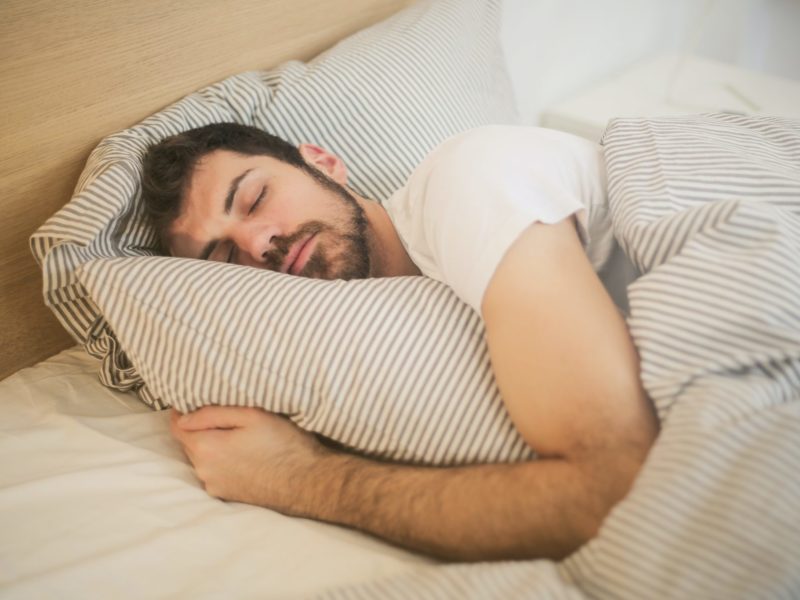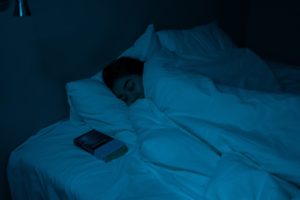Building healthy sleep habits is foundational for overall health and wellness. Your stress levels, body composition, hormones, and cognition will all be negatively impacted without adequate sleep. Those who struggle to get a good night’s rest experience weight struggles, hormonal imbalances, brain fog, and even long-term chronic diseases.
Like most healthy habits, improving your sleep hygiene will take time and dedication to accomplish. Here’s how to build a healthy sleep routine in six simple steps.
Invest in a Quality Mattress and Pillows
Before you look into the latest melatonin supplement or miracle fix for better sleep, take some time to consider whether your bed needs to be upgraded. If your mattress is over eight years old, you could be overdue for a new one.
Few people are aware that different mattresses are meant for different sleep positions as well. For example, you should have a firmer mattress for stomach sleepers and back sleepers and a softer mattress for side sleepers. Bodyweight and pre-existing conditions also have an impact. Heavier people do better with a firmer mattress, while smaller people need a bit of give.
While purchasing a new mattress might not be feasible right now, your pillow choices can also impact your sleep quality. Choose pillows based on your preferred sleep position to ensure proper support, then use additional pillows to support your hips, knees, and arms as needed.
Create a Sleep-Friendly Bedroom
Once you’ve evaluated the bed, look to the rest of the room. According to scientists, the body needs a cool, dark area with noise cancellation for optimal sleep.
Consider adding black-out curtains or wearing a simple eye mask to help create a dark environment. The eye mask option is ideal for those who prefer to leave a hallway light on for children and late-night strolls.
For ambient noise, consider running a fan or noise machine. Many sleepers also put on soft, relaxing music or ASMR recordings instead.
When you sleep, your systems slow, and your body temperature tends to drop a couple of degrees. Getting overheated is common sleep disruption, and it’s much easier to do so at night. Program your thermostat to cool down a few degrees at night or use a fan.
Develop a Relaxing Bedtime Routine
One of the strategies parents often use to get their kids to bed is a relaxing bedtime routine. This schedule could include a bath and story time and the self-care tasks that close off the day. Creating a sleep routine helps manage expectations with children and cues the body that it’s time to wind down.
Adults can also benefit from creating a structured sleep routine. Incorporate activities that help you reduce stress and feel relaxed, such as reading a book, journaling, or doing your skincare while listening to music.
Unplug from Technology
It’s not uncommon to engage in mindless scrolling on social media or an unexpected Netflix binge session at the end of the day. The challenge this poses is the interaction between blue light waves and your circadian rhythm. The human body cannot differentiate between daylight and computer screens, which signals your body to stay awake. Sometimes people find it easy to fall asleep while watching a show, but their deeper sleep cycles become disrupted.
Scrolling through Instagram and TikTok also keeps the mind active and engaged, rather than contributing to restfulness. Set a goal to unplug from your technology at least an hour before bed. Then, set your phone on silent across the room when you get in bed; this will also help you stop hitting snooze.
Monitor Your Food and Beverage Intake
If you find yourself getting up to use the restroom a lot throughout the evening, consider altering your beverage intake. Try to stop drinking fluids two hours before bed, having a small sip of water as needed.
Eating later in the evening can also trigger your digestive system and tell your body that it should be working rather than sleeping. If you have reflux or are prone to heartburn, laying down after eating will exacerbate those issues. Try to stop eating two hours before bed.
Customize and Create Consistency
It might take some time and adjustment to find a sleep routine that works for you. For example, drinking a cup of decaffeinated tea might be an integral part of your relaxing bedtime routine, even though it goes against having fluid before bed. In other words, what works for others might not work for you and vice versa.
The key thing to remember is that consistency is essential for healthy sleep. Try to follow the same routine and go to bed at the same time each night for optimal results.
Interested in eating more healthy for life?
Listen to our friends over at Wellness Force Radio to learn about the “5 Must Have Nutrition Fundamentals”









 How to Lose Weight With Hypothyroidism
How to Lose Weight With Hypothyroidism